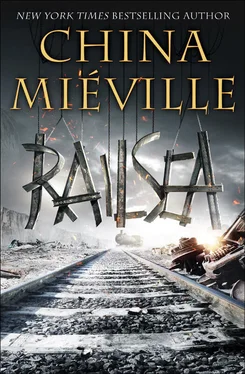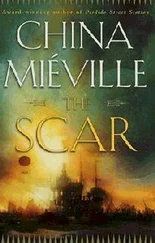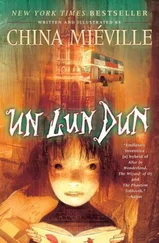Here a small train, three carriages only, manoeuvring the rails of the harbour at the end of great thrumming cables, tugged by two great birds. Well: a buzzard-train, emissary from the Teekhee archipelago. Wooden trains decorated with masks; trains coated in die-cast tin shapes; trains flanked with bone ornaments; double- & triple-decker trains; plastic-pelted trains stained in acrylic colours. The Medes passed the clatter & clank of diesel vehicles like their own. Past the shrill fussy shenanigans of steam trains that spat & whistled & burped dirty clouds, like irritating godly babies. & others.
The railsea: a vast & various train ecosystem. They passed under wires, for the few juiced-up miles of coastal rails. Here a stubby vehicle of scrubbed steel, its few windows tinted, & turning its wheels were back-curved pistons jutting from its sides. What were these grim faces from Fremlo, from all Sham’s crew? This controlled disgust Captain Naphi showed?
Oh. That was a galleytrain. In its hot bowels scores of slaves were strapped in rows, hauling on the handles to turn the wheels, encouraged by whips.
“How can they allow it?” Sham breathed.
“Manihiki calls itself civilised,” Fremlo said. “No slavery ashore. But you know how port-peace works. On each harboured train the laws of home.” There were as many laws among the railsea lands as there were lands. In some were slaves.
Sham imagined kicking down doors & racing through the train corridors, shooting dastardly guards. His impotence embarrassed him.
& solar trains from Gul Fofkal; lunar ones from who-knew-where?; pedal trains from Mendana; a rococo clockwork train that made Zhed smile & salute as its crews sang the songs of winding & twisted their great key; treadmill trains from Clarion, their crews jogging to keep them moving; little trains tugged by trackside ungulate herds able to fight off the burrowing predators of shallow railsea; one-person traincycles; hulking invisibly powered wartrains; electric trains with the snaps & sparks of their passing.
Manihiki.

SHAM’S FIRST TASK at port was not, as he’d expected, to wind bandages, nor to clear up Fremlo’s cabin, nor even to go shopping for whatever doctorly bits & pieces were needed. Instead, to Fremlo’s narrow-eyed fascination, the captain herself ordered Sham to accompany her on what she called “her errands” in Manihiki town.
“You’ve never been here before,” she said, pulling on her gloves, the left one altered to fit her inorganic hand, checking the buttons & fastenings of her dress coat, sweeping dust from her stiff pantaloons.
“No, Captain.” Sham wished he had good clothes into which to squeeze.
By the jollycart, with the putter & grind of displaced earth, the curious snub faces of local moles & baby-sized earthrats, semi-tame & well-fed on thrown scraps & organic rubbish, poked their heads up. Blind or not, they seemed to meet Sham’s gaze. Daybe gripped his shoulder all the way to the harbour. Until they disembarked.
Into a city that, Sham’s limited experience with alcohol suggested, was as giddying as being drunk. Raucous docks, a tight-packed, polyglot crowd. Catcalls, laughter, the shouting of wares. Sham saw people in clothes of all designs & colour & every tradition, beggarly rags through rubberized jumpsuits to the top hats of priests of That Apt Ohm, mimicking the dandy dress of their god. &—Sham stared—the rugged crazy costumes & makeshift uniforms of salvors.
Scholars from Rockvane watched Tharp conjurors; Cabigo emissaries swept their robes out of Manihiki puddles; hunters in Pittman overalls swapped maps & banter with updivers from Colony Cocos. The quaysides were haunts of pickers of pockets, players of rigged games, shake-lurks, fake survivors of fake train wrecks, asking for alms. Sham had no money to protect.
History seemed meaningless here, or at least bewildered. This building was grandly new, with steel in its plaster. This next was older by hundreds of years, & shabby. A mongrel place. Animal-tugged landcars, rickshaws, combustion engines growled past street furniture in endlessly different styles, houses made from what looked nothing like building materials. As if they’d been used as part of a bet.
Manihiki naval officers lounged in uniform, half on duty, half on display, half flirting with passersby. Yes, the maths was correct: such swagger could only be made up of three halves. They might bellow an instruction to a passing kid, or intervene in some minor altercation with tough, sanctioned panache. Imagine them at rail, Sham thought. A ferronaval train grinding down on pirates, guns going, rescue missions & defence-for-hire.
Off went Daybe into the low sky, investigating eaves, carvings, the gargoyles cobbled, Sham realised, out of salvage. “Careful,” he called to the bat. Maybe there were arm-sized flying scorpions above Manihiki. He’d no clue.
He followed the captain, squeezing through the throng. By shops, stalls & hawkers selling bottles & magnets. Flowers & cameras. Illustrations of beasts & angels punishing the hubristic, sneaking out at night & fixing rails, of swirling-winged birds from beyond the world.
Into a region of bookshops, with, Sham realised, a broad view of what made a book a book. Dark rooms full of paper & leather, disks for ordinators & spools of film. Captain Naphi was greeted with courteous recognition. At more than one stand, she said her name & the seller would check a ledger or pull up a file on a glowing screen.
“The Unknown,” they would murmur. “Is that correct? General theories. Also Floating Signifiers, Asymptotic Telos, Evasive Purpose. Loss. That’s what we have you for.” They cross-referenced her on-record tags with texts newly acquired. “Sulayman’s On Hunting Philosophies has a new edition. & there was an article, let me see, ‘Catching Quarries’ in the last-but-three issue of Captain-Philosopher’s Quarterly , but you’ve probably seen it.” & so on.
What am I doing here? thought Sham. If she needed a dogsbody, why ain’t she brought Shossunder?
As if she heard that thought the captain muttered, “Come now, Soorap, eyes up. Your suggestion brought us to Manihiki. Well done. Would you waste these sights?”
She considered the merits of various offerings. Those texts she bought she passed wordlessly to Sham. His bag grew heavy.
At an enormous, shabby & tumbledown warehouse, from within which came raucous bickering, Daybe investigated roofs. Naphi watched it go. “Tell me again,” she said, “the places your friend thought the tracker might be found.”
“Scabbling Street,” Sham said. “The market. She said that’s where the best salvage is.”
She pointed at a sign on the wall. Scabbling Street Market. Sham gaped. Naphi knew, no question, what sort of artefacts it was he hankered to see. After schlepping through all the bookshops, was this a reward for telling her about the tech?
“So,” Naphi said. She indicated, with a sudden lovely sweep of her hands, that he should enter before her. “I am going salvage shopping.”
YOU HAVE THE BOOKS?” THE CAPTAIN SAID. “YOUR JOB is to get them back to the train. I won’t need you, Soorap, for a while.”
“I’ve to go back?” You only just brought me in here , he thought.
“Indeed. I want my books by nightfall.”
“By …?” That was hours away. He had hours. She was giving him hours! Hours to find his way through the streets of Manihiki. Through this market. Naphi was holding out a note. Money, too? “Lunch. Consider it from your share.” He stammered a thanks, but Naphi was gone.
Читать дальше













